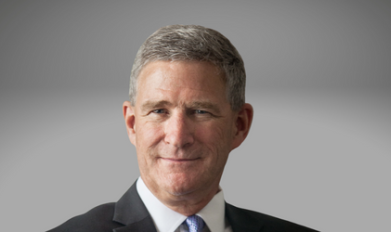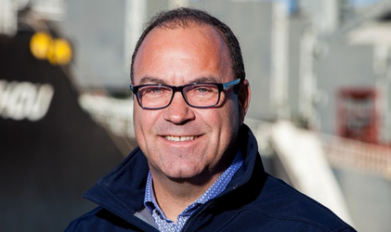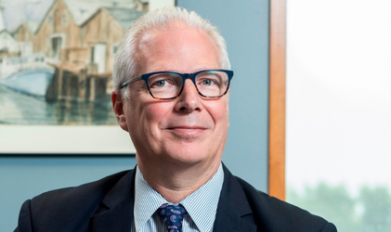A KBRS partner interviews Stephen Lund, the CEO of Opportunities NB, to gain insights on how high-impact Atlantic Canadian organizations are optimizing the potential of people to contribute to the region’s growth and prosperity, and to discuss how strengthening our workforce can enhance our economic outlook.
As the CEO of the crown corporation charged with bringing new investment and employment to New Brunswick, Lund brings more than 30 years of experience in banking, venture capital, business development, and international finance to the role. He speaks to the importance of being proactive in economic development, why ONB has targeted cannabis and cybersecurity as priority growth industries, and why Atlantic Canadians need to prepare our workforce for the jobs that will be available 20 years from now.
Q: You’ve held key leadership roles within Atlantic Canada’s economic development sector for more than a decade. What changes have you noted in our region during that time?
A: I’m seeing our sector’s efforts pay off not just with pockets of success throughout our region but also industries where Atlantic Canada is taking a leadership role. Take a look at Halifax, where the shipbuilding contract and an influx of financial, insurance, and IT companies have resulted in both workforce and economic growth. Meanwhile, New Brunswick is leading the nation in the areas of cybersecurity and cannabis, and there are promising developments in other fields such as artificial intelligence, digital media, and digital health.
With the successes and the presence of strong anchor companies, we see related growth happening in our startup community to support new entrepreneurs through organizations such as Volta Labs, the Creative Destruction Lab, Propel ICT, VENN and the Centre for Ocean Ventures & Entrepreneurship. Together, these developments are fueling business confidence as Atlantic Canada competes internationally. So, I’d say, in many respects, our region is punching above our weight, but on the whole, we are still not quite where we could be.
Q: You mentioned cannabis and it is clear that our region, particularly New Brunswick, has emerged as a leader in establishing the infrastructure to support this industry. What is it that sets the Atlantic Provinces apart from the rest of Canada in building this sector?
A: It’s all about being proactive. ONB knew the legislation was coming from the federal government and we partnered with the provincial government to look at it from an economic development angle. We knew New Brunswick had a solid foundation to build on. We have three billion-dollar companies – Irving, McCain and Cooke – who have well-established expertise in growing products for the world market, be it trees, potatoes, or fish. From the outset, we started talking to producers to share information on New Brunswick’s strengths. We started working more closely with the country’s largest cannabis research group, RPC. We engaged academia to drive research in medical cannabis and we engaged our college system to work with industry to develop relevant programming. To date in New Brunswick, we have created over 1,000 jobs with an anticipated 3,000 more jobs by 2023.
The same thing happened with cybersecurity. In 2015, we were invited to Israel to explore the latest developments in the sector. While visiting IBM’s operations in Israel, I learned that its global cyber operations around the world all report to its Fredericton office. That left quite an impression and inspired me to launch CyberNB, a lead agency to focus on attracting cybersecurity companies, supporting startups, and developing a talent pipeline. As the first province to implement a strategic plan to grow the cyber sector, we had an early advantage from a national perspective. The same thing that happened with cannabis, and we are now hoping to replicate that in the realm of digital health.
Q: How much does New Brunswick’s agricultural legacy factor into its leadership in the cannabis sector?
A: It was absolutely a factor, but our province’s success has been driven primarily by our complete value proposition. You need strong talent, reasonable business costs, supportive government, and infrastructure if you want to attract any industry. We have that, and we now have companies such as Zenabis, OrganiGram, and Canopy Growth that have located here, providing hundreds of jobs across New Brunswick. It also helped that we had the support of key individuals, such as Brian Harriman, the president and CEO of Alcool NB Liquor, in promoting our province to the industry. The ONB team has developed an approach that takes into account all New Brunswick stakeholders such as the Department of Agriculture, Department of Finance, Department of Health, academia, and the private sector. As a result, New Brunswick has been named the most progressive government by the Canadian cannabis industry for two years in a row.
Q: What do you expect will be the impact of the emerging cannabis industry on the province’s workforce in terms of job creation or skills required?
A: The impact will be significant in terms of jobs that are being created. We have research chairs being established at the universities. We’re bringing back PhDs who have expertise in this area. We are also seeing new educational programs at the community colleges to prepare people to work in this industry. There is a wide range of jobs being created with an equally wide range of skills required, and that will be good for our province.
Q: You’ve noted other benefits of building a strong cannabis sector, but what are the biggest challenges facing the region in terms of managing this emerging industry?
A: One of the biggest challenges the industry is facing right now is shortage of supply but, over time, that will work itself out. Beyond that, there remains considerable societal stigma about cannabis, so it will take years before it is regarded as mainstream. Canada is only the second country in the world to legalize it for recreational use. Regardless, there are several countries in the world where cannabis is approved for medicinal use, and that opens opportunities for our companies to expand and export globally.
Distribution is another issue that is currently unresolved. In Nova Scotia, cannabis is available through the provincial liquor commission. In New Brunswick, it is handled by standalone operations. In Ontario, you can only buy it through the mail at this point. It remains to be seen which model will be the best one.
There are also challenges related to recruiting the right type of labour, as well as policing and enforcement. There is no equivalent to the breathalyzer yet. The products that are currently being tested are clunky and do not work well, but that will be resolved over time.
Q: You mentioned exporting, and we tend to think of that as product-based, but it could clearly take different forms, such as information or services like cybersecurity. Are we as innovative or aggressive as we should be as a region in pursuing those opportunities?
A: That is one area where I believe, collectively, there is so much more our region could do. Currently, only 3 to 5 per cent of Atlantic Canadian companies export. As you say, it’s mostly goods, such as shipping lobster to China. But the fact is we are a service-based economy – probably in the range of 80 per cent. I don’t think we’ve realized the significant economic impact of exporting services. But look at IBM or CITCO. Both are bringing money into the region and the potential to build on that success is vast.
That goes back to something I’ve always said: if you want to grow the economy, you need to focus on four things – exporting your products, being productive, having a vibrant entrepreneurial climate, and securing new investment. You can’t cherry pick. You need all four. But to do that, you need to be aggressive. You need to identify opportunities and get out there and make things happen. No one in New York City is going to suddenly decide to set up in Fredericton just because we lowered taxes. That’s not the way it works. The more aggressive we are in getting out there and promoting our region and our strengths, the more business investment and activity we can generate.
Q: All this investment and activity will require an expanded labour force with specialized skill sets. What do you see as the most effective strategies or approaches for attracting and retaining talent in Atlantic Canada?
A: Again, I come back to the fact that we need to be aggressive, both as a region and as business leaders. We need to focus on finding innovative solutions that ensure we have the workforce required today but also the workforce of tomorrow. At ONB, we have had great success by aligning our efforts with partners who are tasked with the immigration, population growth, and workforce development files.
Even so, I do worry about ensuring our companies have the right people at the right time to fuel their growth. Our population is aging. And while recently we have been doing relatively well in attracting new people into the region, retention is still a concern. ONB is working on a number of campaigns, roadshows, and other initiatives to bring new people here, or bring them back home. We are also working with local employers to attract people through the Atlantic Immigration Pilot Program. We are starting to see good numbers from that, but there is more work to be done. And we are not the only region facing this talent challenge. Even markets like Toronto are struggling to find good people, which is why we need to be more aggressive in our efforts to not only attract talent but also keep it.
Q: Looking across all sectors, what do you predict will be the defining change in Atlantic Canada’s workforce over the next five to 10 years?
A: I think our region and our business leaders need to develop our workforce based on where the opportunities will be. Approximately 40 to 50 per cent of current jobs will not exist 20 years from now, but there will be new jobs in areas like artificial intelligence and cybersecurity. We need to be ready for that, and so do our graduates. Our education programing needs to be tailored to meet the requirements of tomorrow’s jobs.
At the same time, we must welcome skilled immigrants to play a bigger role in our workforce. We need to be more targeted and aggressive in determining not only how we attract newcomers but also how we retain them. We also need to do more to hire and keep millennials. This is a demographic that wants it all, and they know that if they graduate from university today with a strong skill set, they can decide where they want to live and then look for a job. In other words, the world is their oyster.
For those reasons, we need to think of areas where we can be world leaders. There are great things happening throughout the region, but we need to move into and dominate new or emerging sectors. That means getting over the negativism that has held us back traditionally. We need to believe and to tell the world that we’re as smart as anyone and we can compete with any market, and by and large, that is starting to happen.
That’s how we’re going to attract and keep people: by getting to a point where we are a highly attractive place to live and work. A place so great that when our young people go away to study, they cannot wait to get back here. But we cannot do that by being all things to all people. We need to create or attract superstar companies in emerging sectors because that is what will bring superstar talent here.
About Atlantic Leader Insights
Atlantic Canada’s economy is fueled by a diverse array of private and public sector entities that employ thousands of people and contribute to our region’s growth and prosperity. But how are these organizations optimizing the potential of their people, and what insights have they gained about the future of our economy from their innovative initiatives?
KBRS recognizes the critical importance of attracting, developing and retaining inspiring leaders and top talent within Atlantic Canada. We sat down with leaders at several high-impact Atlantic Canadian organizations to talk about our region’s opportunities and challenges. This article is one in a series that aims to collect these leaders’ insights on how we can enhance our economic outlook by strengthening our workforce.

CEO, Opportunities NB, 2015 - 2020


















